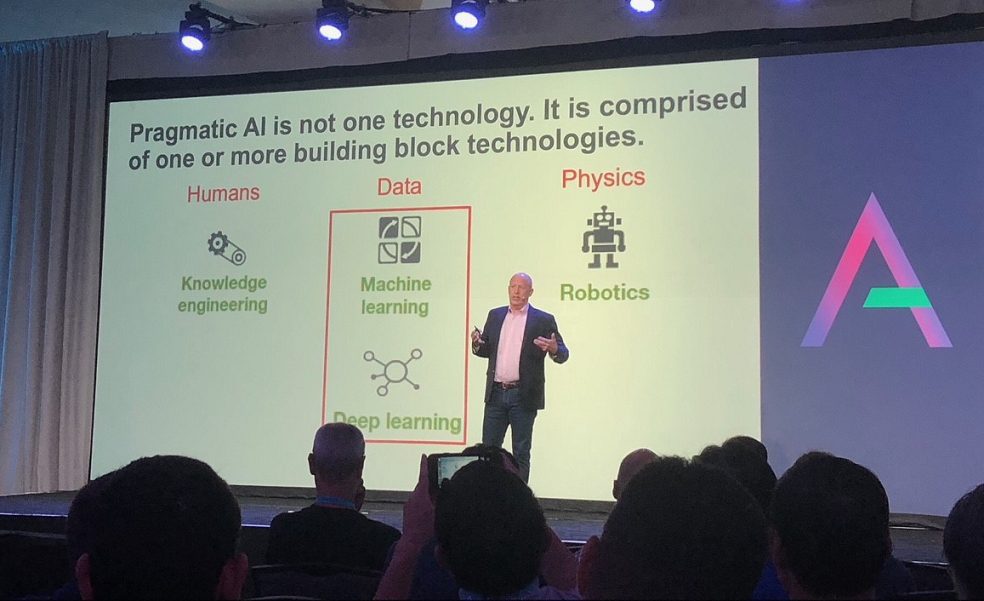Artificial intelligence and its impact on online product search is a hot topic for retailers, and it was the center of attention at the Activate 2019 conference held in Washington, D.C. Sept. 9-12. In fact, one keynote session sought to go out of the way to “demystify” AI for the audience, particularly since Forrester Research VP and Principal Analyst Mike Gualtieri pointed out that within five years, 90% of enterprises either will have implemented, or will plan to implement, AI technologies.
But as more businesses onboard AI, Gualtieri asserted that they will have to focus on “pragmatic” AI. Pragmatic AI is narrower in scope than the “pure” AI that’s typically portrayed in science fiction as being able to outperform humans at all tasks. Pragmatic refers to computer systems such as IBM Watson, which can exceed human intelligence in specific areas, in combination with “building block” technologies such as human-poweredknowledge engineering, machine learning, deep learning and robotics.
With pragmatic AI, Gualtieri recommends businesses conduct real use cases, not science experiments, such as predicting supply chain issues to decide how to reroute systems or detecting fraud ahead of time to figure out the best way to recover.
“Neither Google or IBM can snap their fingers and all of a sudden it’s a lawyer, a doctor or an engineer,” Gualtieri said during the keynote. “You have to build these models individually. One piece of advice is to make sure your executive leadership understands this is what we’re talking about. Pragmatic AI, we can do now. But pure AI — nope. Data is a huge prerequisite of this.”
Enterprises must leverage all the forms of data they have to get the most out of their AI systems, according to Gualtieri. He highlighted numerous categories of data points that are vital to AI success and that are particularly valuable for retailers, including:
- Customer transaction data;
- POS data;
- Inventory data;
- Supply chain data;
- Product/service data;
- ERP and manufacturing data; and
- Sales and CRM data.
“The people who are going to dominate artificial intelligence are the ones who have the rich data and implement the most use cases the fastest,” Gualtieri said. “Part of the requirement is to have technology that can break down these silos. I always say ‘Algorithms get all the press, but remember it’s the data that actually makes this success.’”
RTP/Lucidworks Study: Want To Boost Conversion Rates? Make Products Searchable Immediately
At Activate, Diane Burley, VP of Content at Lucidworks, unveiled preliminary results of the 2019 Retail Benchmark Survey, developed in conjunction with Retail TouchPoints. Burley highlighted a major opportunity for retailers: that a successful search increased the online conversion average from 2.77% to 4.63%.
Yet despite search’s importance in boosting these conversion rates, 53% of retailers still take more than 24 hours to add merchandise to an online catalog that makes them accessible via search; only 21% add these items instantly. This ability seems to be associated with successful organizations: among retailers that generate more than $400 million per year, the “immediate” percentage rises to 63%.
“If items are in the product catalog but the product catalog is not made available online because it hasn’t been indexed and the shopper can’t find it, then they obviously can’t buy it,” said Burley. “You want to see retailers get that index timing down to near-instantaneously so that they can take advantage of that conversion opportunity.”
The lack of site updates concerns retailers in other ways, especially during peak season: 69% say that stockouts resulting from a failure to update online inventory continue to be a major worry or pain point, while 49% cite undiscoverable products as a top issue. Site down time and/or performance degradation concern 73% of retailers, making it the chief concern.
“When many shoppers come to your site, a large portion are going to a search bar,” Burley said. “If they don’t find what they’re looking for, that just made some other brand very happy.”
As far as delivering shoppers to detailed products, retailers still have work to do. More than 42% of merchants said that the percent of searches that lead to a product detail page ranges between 16% and 25%. Another 24% said the percent landed between 26% and 35%, while only 7% of retailers saw more than 35% of searches leading to a product detail page.
Goop Exec: AI-Powered Recommendations Must Feel Like A ‘Two-Way Conversation
A panel discussion at the event, which included execs from Goop, Intel and Morgan Stanley, revealed how organizations in various industries approached search and AI initiatives to develop their digital transformation efforts. Juan Paul Ramirez, Chief Technology Officer at Goop, noted that the e-Commerce company is still trying to maintain a personal touch even as it onboards more AI-powered technologies.
“You want to make sure that machines can nominate but humans can validate the content that we have,” Ramirez said. “As a lifestyle brand our content can vary from the e-Commerce site, the products that we build off the credibility of the brand, and even things like food, travel and wellness in general. It’s less about building hard and fast recommendation engines and much more about making sure that we still feel like we have that personal touch with 20 to 30 million people a year.”
Ramirez noted that keeping that personal touch hinges on how much the relationship between the shopper and the retailer feels like one between two friends. The more it does so, the more brand trust thrives even as AI functions in the background.
“Think about when a machine can guess what the next product or article is you are looking for, and it seems like it’s been eavesdropping on your conversations — that feels creepy,” Ramirez said. “When your friend knows exactly what you want for dinner or your friend can put together a trip or an itinerary, that feels comfortable. That’s the type of relationship we want to have. It turns out you make every choice count. You don’t want 15 choices to eat, you want one place for dinner, you want it to be delicious and hopefully it’s good for you. If we can take that credibility and propose it in ways that make it feel familiar, make it feel like you’re having a two-way conversation, that’s when we succeed.”













